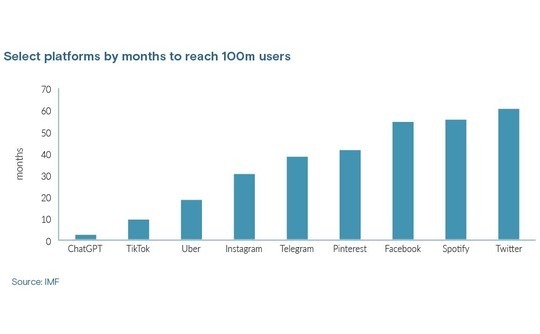
Generative AI in due diligence: Crunching new numbers

Private equity is rediscovering artificial intelligence as a due diligence tool in the wake of ChatGPT. Data security, legal, and technical risks have curbed uptake somewhat, less so for venture
In what has become an all-too-common due diligence scenario for private equity firms, a company under review attributes its performance blues in recent years to the pandemic. The question is how to discern where COVID-19's responsibility stops and management's begins. The answer, at least in theory, is in artificial intelligence (AI).
To be more precise, this is a job for generative artificial intelligence (AI) as popularized by ChatGPT, the chatbot launched by Microsoft-backed OpenAI last November. Its advantage over previous applications of the technology is in the ability to process unstructured data through large language models (LLMs).
The generative AI edge means informal, unfiltered data sources can be analysed in ways that reveal patterns that answer questions with complex variables such as the pandemic performance blame game.
These kinds of data sources span publicly available individuals' social media content to private sources such as credit card records and customer feedback on organisations, which is by turns public and private. They are typically estimated to account for 80% of the information any investigation can scrape up about a given company.

Daniel Angelucci, a managing director focused on digital and technology services at Alvarez & Marsal, observes that PE investors are embracing generative AI enthusiastically, albeit with some lack of reflection. The problem is that the user-friendly, Google-on-steroids experience delivered by generative AI is such a hit that the viability of the results is at risk of being overlooked.
"You need a lot of data, and you need to understand your biases and make sure that you overcome them," Angelucci said. "It's very easy to unconsciously feed the model with the data that you expect is being probative without getting a complete dataset. The biggest threat is that you create something that confirms your own biases."
Into the weeds
Due diligence is a logical place for private equity firms to start using AI because it plugs capacities around summarizing large quantities of data into an operational process with significant potential for value enhancement due to its time constraints.
The industry continues to see the technology as a co-pilot rather than a decision-maker, and that appears unlikely to change. But there are hopes for improving insights in terms of predictive modelling of company activity and markets with complex variables, portfolio company monitoring, forecasting where industries will be disrupted, and optimising exit timing.
This isn't happening to a significant degree anywhere yet, even at the largest, best-resourced firms, according to Akash Takyar, CEO of US-based AI consultancy LeewayHertz. However, Takyar is tracking a significant spike in private equity interest in generative AI, claiming to have engaged on at least a preliminary basis with about half of the GPs on the US east coast since ChatGPT emerged.
Initial experiments have been with internal unstructured data, partly because of its relative credibility. This means streamlining data sharing within disparate teams, advanced data management, automating busywork, generating reports based on internal data, and automatically drafting correspondences with counterparties, including compliance documentation for LPs.
In one use case, Takyar described a PE firm that needed to quickly figure out its exposure to ruined crypto company FTX. This involved plunging into a web of funds, sub-funds, portfolio company partnerships, and other investments. The task was carried out by a product called ZBrain that ingests data from more than 80 sources, many of them unstructured.
Data security is the sticking point in these affairs. Although ZBrain can be privately deployed, working entirely behind a GP's firewall, an LLM such as ChatGPT is only available via an application programming interface (API) or infrastructure such as Microsoft OpenAI Service. That means PE firms still need to send the private data to the OpenAI GPT model via ZBrain.
"Their dilemma is what if Microsoft or OpenAi uses the data for further finetuning or training the model. OpenAI and Microsoft recently clarified that they will not use the data for further training, however the companies are still taking some time making decisions," Takyar said, noting that although a PE firm hosting an LLM in-house is an option, the results would be inferior to ChatGPT.
"Private equity firms will feed the data. They want to run their own show, but they will require a bigger workforce. That means they will have more and more AI people on their team down the line."
There are governance issues around generative AI beyond internal data leakage, most of which boil down to the reality that the processor of external data is not the owner. Whether it be the PE firm or its consultant, the processor plays the role of data custodian or steward and can be held liable for breaches of confidentiality and compliance arrangements agreed by the owners with other parties.
The usage of copywrite-protected material thickens the plot, both in terms of using materials in a way that is not permitted and generating supposedly original material that is indeed plagiarised. The body of law covering these issues remains in its infancy.
Getting it right
More prosaically, generative AI is often wrong. PE firms using the technology to create reports are prone to distribute misinformation to counterparties and therefore risk reputational and legal blowback. Alvarez & Marsal's Angelucci expects greater adoption to coincide with a rise in litigation against organisations that don't keep their covenants with regard to data processing.
"There's going to be increasing scrutiny of the data that these foundation model providers use, and I fully expect that they will have to audit and provide providence for the data that they use for the training of their language models," said Richard Fleming, leader of Bain & Company's Asia advanced analytics practice.
"One of the difficulties of using your own model is, increasingly, you'll have to justify the providence of the data that goes into it. That's a tricky area, and many of our clients are staying away from it at the moment."
Bain teamed up with OpenAI last February to jointly offer services that help enterprises maximise value from integrating AI into operations. Private equity is expected to benefit from such initiatives mostly in terms of portfolio company value-added work. But Sebastien Lamy, co-head of Asia PE at Bain, believes the best way for GPs to do this is to start experimenting internally.
The idea is that PE firms cannot realistically advise investees on generative AI integration without any experience of their own. Simple, low-risk internal data management programmes and diligence-supporting report creation can inform more ambitious automations in portfolio companies and lay the groundwork for bona fide market insight generation.
"We've been using generative AI to try to find interesting trends for investment in the tech sector, using simple models and data from open sources on the internet, including social media platforms," Lamy said, referring to some early experiments. "Coming out of that, we're seeing buzz in investment themes and forecasting what could be sectors to invest in ahead of the curve."
This was happening in VC long before the ChatGPT craze. US-based Rocketship claims to have used a predictive AI deal flow engine since its inception in 2014. Its method has always been based on natural language processing (NLP), a branch of AI focused on interpreting text.
The advent of generative AI and LLMs has only extended an existing capability by allowing the firm to automate the creation of recommendation reports and build "categorization engines" for grouping potential target companies by sub-sector or specialisation.
Rocketship invests exclusively in companies that were sorted and sourced by its AI. All deals are outbound; any incoming pitches are simply dropped anonymously into the data pool and subjected to the machine-guided shortlisting process before the still-essential person-to-person engagement. The firm has no deal sourcing hypothesis for any sector or geography – led only by its algorithms.
"When we don't trust the data, we're in trouble. So, we decided to completely let go of our own biases," said Madhu Iyer, a partner at Rocketship, referring to the firm's unexpected, data-prompted expansion into India. "The data tells us where we need to be and what we need to be investing in at any point in time."
People power
The approach may not be as replicable with off-the-shelf technology as it seems. Iyer, formerly a chief data officer at Gojek, is one of six partners and investment committee members at Rocketship, who are all also computer scientists and data operators. She notes this kind of technical experience is necessary to know how to properly feed a model and when discrepancies in data require human intervention.
There is also an element of brute force in the strategy. Rocketship typically uses more than 200 data sources in its deal screening process, sometimes over 500. The idea is that the more lights you shine on a company, the more likely you are to get an accurate picture.
In a way, the deal flow engine doubles as an exit predictor because it measures the success of a company by forecasting when it will raise later rounds – which could facilitate a secondary exit – or achieve an IPO. Standout investments include industrial goods marketplace Moglix and property portal Nobroker, both Indian unicorns.
"Fund I has seven unicorns. It's a testament to the fact that we went head-in with the data and we really didn't have anything else to go by. The fact that we're in India to the extent we were in Fund I and Fund II is completely accidental," Iyer said. "We trusted our algorithms and went in, and the algorithms were right."
It's worth emphasising that Rocketship's technical bench is a bigger differentiator than its algorithms. By all accounts, developing or accessing the AI models themselves is the easy part. Evaluating the data inputs and knowing which questions to ask is the secret sauce. Embracing generative AI will be about talent, not tech.
Square Peg Capital, which is still in the tinkering stage of its AI usage, hired a full-time data engineer, Kai Yi Yong, formerly of Grab, last year to create a proprietary model for company data aggregation. To date, the use of LLMs has less about achieving unique insights than improving productivity, which frees up more time for in-person due diligence with founders.
"We're increasingly seeing funds hire for these specific capabilities and my personal view is that it will go from an advantage to a necessity over time for fund managers," said Ed Barker, a principal at Square Peg.
"Where we've seen it be most effective is having combined investment and data capabilities that work closely together, allowing greater context sharing of data-driven impact and quicker iteration and experimentation."
Saving time
Hong Kong's Deploy, a due diligence and deal scouting platform for family offices and VC firms, also testifies to the virtues of the combined human-AI approach. Indeed, Sophiya Chiang, the firm's founder, describes the offering as a more affordable, start-up-oriented, and AI-standardized version of private equity expert networking service GLG.
Deploy brings together about 50 in-house staff, another 50 expert collaborators, and a deal screening tool that uses NLP and LLMs to extract quantitative data from stacks of unformatted and often qualitative content-based pitch decks.
A predictive model that compares companies to shortlist likely winners will launch later this year. Gathering the necessary data for such an engine is a challenge, so Deploy is taking a vertical-focused approach, starting with property tech.
Chiang claims the service provides investors with insights to make informed and repeatable decisions, while levelling the playing field for prospective but unknown founders who might not have otherwise been able to get an audience with investors. It represents a recognition that in due diligence, having better visibility and saving time is often more valuable than a recommendation.
"A lot of wasted resources are put into the due diligence process because a lot of times, investors meet the founders and go through a lot of chitchat before they actually run the numbers and ask for a datasheet," she said.
"Then if the due diligence process goes forward, eventually they're like, ‘We've already put in so many resources in this start-up, we might as well go ahead with a term sheet."
Latest News
Asian GPs slow implementation of ESG policies - survey
Asia-based private equity firms are assigning more dedicated resources to environment, social, and governance (ESG) programmes, but policy changes have slowed in the past 12 months, in part due to concerns raised internally and by LPs, according to a...
Singapore fintech start-up LXA gets $10m seed round
New Enterprise Associates (NEA) has led a USD 10m seed round for Singapore’s LXA, a financial technology start-up launched by a former Asia senior executive at The Blackstone Group.
India's InCred announces $60m round, claims unicorn status
Indian non-bank lender InCred Financial Services said it has received INR 5bn (USD 60m) at a valuation of at least USD 1bn from unnamed investors including “a global private equity fund.”
Insight leads $50m round for Australia's Roller
Insight Partners has led a USD 50m round for Australia’s Roller, a venue management software provider specializing in family fun parks.







